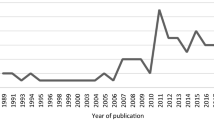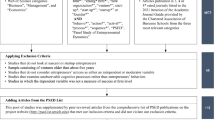Abstract
The goal of this paper is to investigate entrepreneurial activity and to analyze the incentives of female participation in the labor market. Female entrepreneurial activity is closely related to social and economic issues. They represent a driving force, active and effective members of economic, political, professional and managerial societies. On the other hand, they have families with serious maternal responsibilities and inelastic household obligations, roles which they are trying to balance effectively. To that reason, specific actions and carefully designed measures are essential in encouraging and promoting them to engage into entrepreneurial activity. To investigate the issue of entrepreneurial activity, personal characteristics and various motivation incentives are examined in order to determine the major factors that may influence female entrepreneurial spirit in Greece. Obtaining data from 1600 industrial firms located in the prefecture of Piraeus over the period 1999–2009, this study makes use of the panel methodology approach to provide evidence about the main determinants of female entrepreneurship. What is found is that a combination of pull and push motives and effective mentoring framework, in addition to a set of personal characteristics such as risk of failure, educational level, creativity, innovativeness, ambitiousness and marital status, seem important for the encouragement of women entrepreneurship in Greece to start up a new business. The implications seem very substantial for the formulation and implementation of effective support policies and measures for female entrepreneurs’ vital start up and early stage period.
Similar content being viewed by others
References
Aristotle University of Thessaloniki (2002a). ‘Female Entrepreneurs’ Profile and the Factors that Affect Female Entrepreneurship in Greece’, Research under the AWAKE project, Ecos Ouverture, Thessaloniki (in Greek).
Aristotle University of Thessaloniki (2002b), ‘Women Entrepreneurs’ Profile and Factors Affecting Women Entrepreneurship’, Research under the AWAKE project, Ecos Ouverture, Thessaloniki.
Audretsch, D. B., & Thurik, A. R. (2002). Capitalism and democracy in the 21st Century: from the managed to the entrepreneurial economy. Journal of Evolutionary Economics, 10, 13–34.
Begley, T. M., & Boyed, D. P. (1987). A comparison of entrepreneurs and managers of small business firms. Journal of Management, 13, 99–108.
Branssington, F., & Pettitt, S. (1997). Principles of marketing. Pitman Publications.
Brush, C. (1997). Women-owned businesses: obstacles and opportunities. Journal of Developmental Entrepreneurship, 2, 1–25.
Brush, C. G. (1992). Research on women business owners: past trends, a new perspective and future directions. Entrepreneurship Theory and Practice, 16, 5–29.
Brush, C. G. (1999). Research on women business owners: past trends, a new perspective and future directions: an extension. Entrepreneurship Theory and Practice, 16, 5–30.
Buttner, H., & Moore, D. (1997). Women’s organizational exodus to entrepreneurship: self-reported motivations and correlated with success. Journal of Small Business Management, 35, 34–47.
Bygrave, W. (1994). The entrepreneurial process. In W. Bygrave (Ed.), The portable MBA in entrepreneurship. Wiley: NY.
Caree, M. A., Van Stel, A. J., Thurik, A. R., & Wennekers, A. P. M. (2002). Economic development and business ownership: an analysis using data of 23 OECD countries in the period 1976–1996. Small Business Economics, 19, 271–290.
Carland, J. W., Huy, F., Boulton, W. R., & Carland, J. A. C. (1984). Differentiating entrepreneurs from small business owners: a conceptualization. Academy of Management Review, 9, 354–359.
Carter, N. (2003). Female Entrepreneurship and Innovation. Paper presented at the International WIR Conference, Berlin.
Centre for Women’s Business Research. (2005). Key Facts about Women Owned Businesses, available: www.womensbusinessresearch.org/researchstudies.html, pp. 354–359.
Collins-Dodd, C., Gordon, I., & Smart, C. (2004). Further evidence on the role of gender in financial performance. Journal of Small Business Management, 42, 395–417.
Deakins, D. (1996). Entrepreneurship and small firms. New York: McGraw-Hill.
Deakins, et al. (1997). New venture support: An analysis of mentoring provision for new and early stage entrepreneurs. Journal of Small Business and Enterprise Development, 5(2), 151–161.
Gartner, W. B. (1988). What are we talking about when we talk about entrepreneurship? Journal of Business Venturing, 5, 15–28.
GEM (2007). Report on Women Entrepreneurship, Executive Summary, www.babson.edu/cwl.
Glancey, K., Greig, M., & Pettigrew, M. (1998). Entrepreneurial dynamics in the small business service sector. International Journal of Entrepreneurial Behavior & Research, 4, 249–268.
Glueck, W., & Jauch, L. R. (1984). Business policy and strategic management (4th ed.). New York: McGraw-Hill.
Grant, J. (2003). Growing rural female entrepreneurs: Are they starved of ICT skills? ICSB 48th World Conference Proceedings, June.
Grant, J. (2004). ‘Farmers’ markets: Are they growing female entrepreneurs? Third International Conference in Business and Economics, Amsterdam, July.
Green, E., & Cohen, L. (1995). Women’s business: are women entrepreneurs breaking new ground or simply balancing the demands of women’s work in a new way? Journal of Gender Studies, 4, 297–315.
Hadjidema, S. H., & Kitsos, C. P. (2006). Innovation and Woman Entrerpreneurship: Analyzing Data from a Survey in Greece’, 17th ISPIM Annual Conference (International Society for Professional Innovation Management), Athens, June.
Hassid, I. (2000). Greek women entrepreneurs. The Greek Economy, Epilogi, 202–206.
Henry, C., & Johnston, K. (2007). Female entrepreneurship, implications for education, training and policy. In: N. Carter, C. Henry, B. O. Cinneide, & K. Johnston (Eds.). Routledge Taylor and Francis Group.
Hisrich, R. D. (1990). Entrepreneurship/Intrapreneurship. The American Psychologist, 45, 209–222.
Hogeschool van Amsterdam (1994). Success and failure of starting women entrepreneurs in Holland. Research under the NOW Initiative, Amsterdam.
IOBE (2005). Entrepreneurship in Greece 2004–2005. Athens.
Research, K. (1999). Female entrepreneurship in Greece. Athens: Kapa Research.
Karagiannis, A. D. (1999). Entrepreneurship and the Economy (pp. 127–144). Athens: Interbooks.
Karagiannis, A. D. (2003). The entrepreneurial environment and the Greek economic policy. Piraeus: University of Piraeus.
Loutfi, M. (2001). Women, gender and work: What is equality and how we get there. Geneva: International Labour Office.
Macaulay, C. (2003). Changes to self-employment in the UK: 2002 to 2003. Labour market trends. London: Office for National Statistics.
McClelland, D. C. (1961). The achieving society. New York: Collier/Macmillan.
McKay, R. (2001). Women entrepreneurs: moving beyond family and flexibility. International Journal of Entrepreneurial Behavior & Research, 7, 148–165.
Metcalf, J. S. (1994). Evolutionary economics and technology policy. The Economic Journal, 104, 931–944.
Ministry of Interior (2005). Public Administration and Decentralisation Paper.
Minniti, M., Arenius, P., & Langowitz, N. (2005). Global entrepreneurship monitor: 2004 report on women and entrepreneurship. Babson Park: Babson College and London Business School.
Newey, W. K., & West, K. D. (1987). A simple positive semi-definite heteroskedasticity and autocorrelation consistent covariance matrix. Econometrica, 55, 703–732.
OECD (Organisation for Economic Co-operation and Development). (2004). OECD promoting entrepreneurship and innovative SMEs in a global economy: Women’s entrepreneurship: issues and policies. Paris: OECD.
Orhan, M., & Scott, D. (2001). Why women enter into entrepreneurship: an explanatory model. Women in Management Review, 16, 232–247.
Pedroni, P. (1999). Panel cointegration: asymptotic and finite sample properties of pooled time series tests with an application to the PPP hypothesis: new results. Oxford Bulletin of Economics and Statistics, 653–670.
Prowess, J. (2005). The regional state of women’s enterprise in England. available at:www.prowess.org.uk/documents/TheStateofWomensEnglandintheEnglishRegionsthisistheonetodistribute.pdf.
Rosa, P., Carter, S., & Hamilton, D. (1996). Gender as a determinant of small business performance: insights from a British study. Small Business Economics, 8, 463–478.
Rute, M. (2006). “The role of mentoring in the promotion of women entrepreneurship”, Eurochambers Conference, European Commission Enterprise and Industry Directorate-General, Brussels.
Sarri, K., & Trihopoulou, A. (2004). Female entrepreneurs’ personal characteristics and motivation: a review of the Greek situation. Women in Management Review, 20, 24–36.
Sarri, K., & Petridou, E, (2007). Mentoring support for startup female entrepreneurs: The Greek situation. National Council for Graduate Entrepreneurship, Working Paper 002/007.
Shailer, G. (1994). Capitalists and entrepreneurs in owner-managed firms. International Small Business Journal, 12, 33–41.
Slovic, P. (2000). The perception of risk. London: Earthscan Publications Ltd.
Stevenson, H. H., & Gumpert, D. E. (1991). The heart of entrepreneurship. In W. A. Sahlman, H. H. Stevenson, M. J. Roberts, & A. Bhide´ (Eds.), The entrepreneurial venture. Boston: Harvard Business School Press.
Storey, D. J. (1994). Understanding the small business sector. London: Routledge.
Thurik, A. R., & Wennekers, A. P. M. (2004). Entrepreneurship, small business and economic growth. Journal of Small Business and Enterprise Development, 11, 140–149.
Vesper, K. (1980). New venture strategies. Englewood Cliffs: Prentice-Hall.
Author information
Authors and Affiliations
Corresponding author
Additional information
Paper presented at the 69th Atlantic Economic Association meetings in Prague, March 2010. The authors wish to thank the participants in the session of Issues in Financial Markets I organized by Professor Nicholas Apergis for their constructive comments and suggestions on an earlier draft of this paper. Needless to say, the usual disclaimer applies.
Rights and permissions
About this article
Cite this article
Apergis, N., Pekka-Economou, V. Incentives and Female Entrepreneurial Activity: Evidence from Panel Firm Level Data. Int Adv Econ Res 16, 371–387 (2010). https://doi.org/10.1007/s11294-010-9277-9
Published:
Issue Date:
DOI: https://doi.org/10.1007/s11294-010-9277-9




